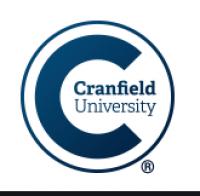PhD in Novel Techniques for the Application of an Aluminide Coating
Energy efficient power generation is a current concern. To maximise energy from gas turbine generators, temperatures must be as high as possible, meaning that modern gas turbines need components with enhanced properties and life, potentially through the use of coating systems. Existing routes for coating large surface areas have limitations, such as being inherently costly and complicated, due to the equipment and process control required to repeatably produce the coatings. This program proposes the development of a next generation coating with enhanced properties, whilst simultaneously moving to a simpler and less expensive slurry process.
As such, this PhD project will address the following research objectives:
Investigate various dip/submersion/paint application methods (which are versatile and cost effective) to determine a suitable coating methodology for further development.
Develop slurry coating application techniques, ensuring that they are environmentally compliant (in line with European legislation; Cr6+ free/REACh compliant) and provide a simple NiAl structure compatible with existing chromium (for CrAl) and platinum (for PtAl) coatings. This will include investigating the effects of ‘hafnium and zirconium’ or ‘yttrium and zirconium’ on the coating, including their ability to promote alpha alumina scale growth and adherence.
Assess the coating(s)’s capacity to be tailored to component requirements (e.g. application to different surface geometries; applying different coating composition across a single component; establishing a one step process to address different environmental issues).
Characterize the coating properties (e.g. oxidation, corrosion, thermal stability, mechanical properties, lifing models), and benchmark against PtAl (targeting increased temperature capability).
Cranfield University is a unique learning environment with world-class programmes, unrivalled facilities and close links with business, industry and governments, all combining to attract the best students and teaching staff from around the world. In the last Research Excellence Framework (REF) assessment, 81% of research at Cranfield was rated as world-leading or internationally excellent. Siemens Energy drives innovation, develops new technologies, applies cutting-edge manufacturing technologies - all to deliver the most advanced gas turbines that will set new standards in terms of efficiency, reliability and emission reduction. "Let’s make tomorrow different today" is Siemens Energy’s genuine commitment to customers and employees on the way to a sustainable future.
This PhD will develop a doped aluminide slurry and demonstrate the slurry’s properties with the intent of increasing gas turbine operating temperatures and, therefore, efficiency. If successful, the outcomes of this project will provide a potential slurry recipe that could be developed and deployed by the industrial sponsor, providing impact for the wider sector.
The successful candidate will have the opportunity to work alongside the industry sponsor and gain significant experience in industrial research and development as well as to present at conferences.
This research programme is technically challenging. The candidate will receive a significant level of technical training including design of experiments, a range of analytical skills, and other transferable skills (including presentation, organisational and project management). The combination of academic and industry contacts will be beneficial to the candidate’s learning experience, future employability and career development.
Intakes
- Jan
- June
- Sep
Application Processing Time in Days: 20
Minimum English Language Requirements
| English Level Description | IELTS (1.0 -9.0) | TOEFL IBT (0-120) | TOEFL CBT (0-300) | PTE (10-90) | |
|---|---|---|---|---|---|
| Expert | 9 | 120 | 297-300 | 86-90 | |
| Very Good | 8.5 | 115-119 | 280-293 | 83-86 | |
| Very Good | 8 | 110-114 | 270-280 | 79-83 | |
| Good | 7.5 | 102-109 | 253-267 | 73-79 | |
| Good | 7 | 94-101 | 240-253 | 65-73 | |
| Competent | 6.5 | 79-93 | 213-233 | 58-65 | |
| Competent | 6 | 60-78 | 170-210 | 50-58 | |
| Modest | 5.5 | 46-59 | 133-210 | 43-50 | |
| Modest | 5 | 35-45 | 107-133 | 36-43 | |
| Limited | 4 | 32-34 | 97-103 | 30-36 | |
| Extremely Limited | < 4 | < 31 | < 93 | < 30 |
Job Opportunity Potential
The Career Development Service is an important part of the Student Experience support function. Our team has significant real-world experience in the areas of coaching, recruitment, human resources and business development. We help students develop their personal career journey, so they can find meaningful employment that utilises their Cranfield qualification.
If you are an international student, it is important to be aware of the visas required to work in the UK and abroad after graduation. The following information should act as a signpost to resources, so that you can research your options thoroughly.
Working in the UK after Cranfield
In a major boost for international students, the UK Government has announced a new Graduate route, expanding opportunities for international students to build successful careers in the UK. All international students who join Cranfield in the 2020/2021 academic year will be eligible for the new scheme.
Launching on 1 July 2021, this route will be open to all international students who have a valid UK immigration status as a student and have successfully completed their course at Cranfield. The visa will allow eligible students to work, or look for work, in any career or position of their choice, for two years ( for MSc students) and three years (for PhD students) after completing their studies. During the period of their visa, they will be able to switch onto the ‘skilled work visa’ if they find a job which meets the skills requirements of the UK Government.
Resources for Employers
Cranfield University creates global leaders in technology and management, we are renowned for having a rich student body from culturally diverse backgrounds. With their combination of academic excellence, research capabilities and knowledge of real-world applications, they are able to make valuable contributions to commercial objectives.
For information on sponsoring someone as a Skilled Worker or on a Tier 5 visa, employers should visit the UK Visas and Immigration's guidance for employers. As a student, it is useful to be aware of this, should a potential employer have any questions.
Making your business case to Employers
In order to be successful with any application for employment, you will need to provide evidence for your skills and abilities, as well as demonstrate your career motivation. We have a Learning Pack dedicated to the art of filling in an Application Form, which can be downloaded here; and a Factsheet on Speculative Applications which can be found here.
We would also recommend that you take the time to write a compelling Cover Letter, outlining the type of permit that you are looking for and any steps an employer would need to take in order to hire you. The Learning Pack related to this topic can be found here.
Finally, to be totally proactive and generate your own opportunities, you should read up on The Hidden Jobs Market to discover how to find roles that aren’t advertised; you can download our Factsheet on this here.
National Insurance Numbers
You need to have a National Insurance number if you’re planning to work in the UK. You can start work without one if you can prove you have the right to work here. You do not need a National Insurance number to apply to the EU Settlement Scheme.
Resources for International Students
We have teamed up with Student Circus to help our international students find employment in the UK.
All employers on the site are:
- confirmed as willing to sponsor the UK Work Visa
- verified as offering salaries as per immigration rules
- licensed with the Home Office
- able to provide expert immigration advice
By using the site, our international students can expect to:
- get prepared for the UK job market and build a network
- discover structured and formal paid internships designed with flexibility
- improve their chances to get a job with the same company
- All Cranfield students will receive a log-in to Student Circus once they arrive on campus.
PSW Opportunity
Psw 2 yrs
Admission Requirement / Eligibility Criteria
English language
To study for a formal award at Cranfield you will need to demonstrate that you can communicate effectively in English in an academic environment. Full details of how you can meet this requirement can be found on our English language requirements page.
Approved English tests for PhD programme
Please note that:
We verify all test scores with the test providers.
We are only able to accept tests taken within two years of the course start date.
All elements of the test results must be demonstrated in one test, we are unable to accept a combination of scores across two or more tests.
In extremely rare circumstances we may reject a test score if one element of the test has a very low score. This would only occur if we believed this would impact on your ability to study with us or if the score did not meet UK Visas and Immigration (UKVI) requirements to study in the UK.
IELTS Academic - 7.0 overall and minimum skill component scores of 5.5 reading, 5.5 listening, 5.5 speaking and 6.5 writing.
TOEFL iBT - 100 total and minimum skill component scores of 18 reading, 17 listening, 20 speaking and 23 writing.
PTE Academic - 68 overall and minimum skill component scores of 59 reading, 59 listening, 59 speaking and 65 writing.
Cambridge Assessment English tests - Cambridge English Scale score of 190 overall and minimum skill component scores of 160 reading, 160 listening, 160 speaking and 175 writing.
Trinity College London Integrated Skills in English III - Pass.
We are accepting additional tests taken in 2021
We understand that due to limited test availability, many of you are experiencing difficulties taking one of the above tests. We are now also able to accept the English tests listed below, some of which are available online.
IELTS Indicator - 7.0 overall and minimum skill component scores of 5.5 reading, 5.5 listening, 5.5 speaking and 6.5 writing.
TOEFL iBT Home Edition - 100 total and minimum skill component scores of 18 reading, 17 listening, 20 speaking and 23 writing.
LanguageCert International ESOL C1 Expert - Pass overall and 33 in all skill components.
- Course Type: Full Time
- Course Level: Doctoral Degree/PhD
- Duration: 03 Year
-
Total Tuition Fee:
56610 GBP
Annual Cost of Living: 9207 GBP
Application Fee: N/A
Similar Programs
- Water Chemistry PhD: Minimisation of Nitrogenous Disinfection By Products and their Toxicological Importance at Cranfield University
- Vehicle Integrity Test and Measurement PhD at Cranfield University
- Tribological investigations on rotatory machinery at extremely high speeds PhD at Cranfield University
- Reasoning and digital twins exploring fault propagation and maintenance PhD at Cranfield University
- Prognostics and condition monitoring of lithium ion battery system PhD at Cranfield University
- Predictive modelling approaches for compound damage occurring in composite materials PhD at Cranfield University

